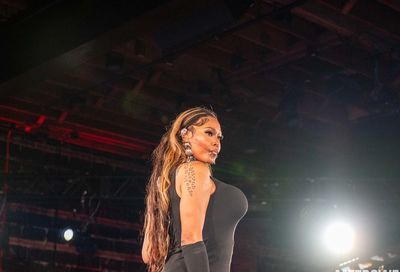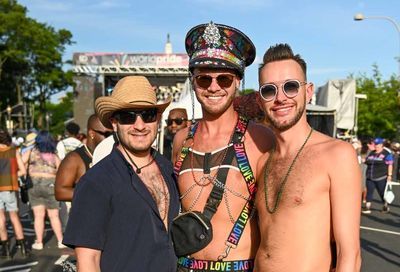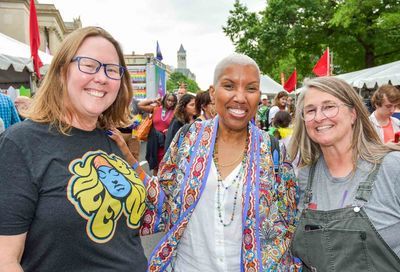So They Say
MW Interviews 2002
Offensive and inspiring.
Outrageous and reserved.
Perplexing and inspiring.
Those are just a few of the ways to describe the outpouring of words MW captured in interviews throughout 2002. Celebrities, activists, and artists told us what they thought about everything from presidential policies to extreme fashion accessories.
On this page, you’ll find some of the best quotes from the past year, culled from in-depth interviews, feature stories and profiles. And for every quote that piques your interest, you can follow the link to the complete story.
 |
“I think he’s a treacherous motherfucker, frankly, and not to be trusted. ”
— Sandra Bernhard states her feelings about President George W. Bush. (2/28)
“I don’t know if Bush is really aware of the people of Iran. The younger generation embraces Western culture and doesn’t care so much about the differences. ”
— Ali Shirazinia, Iranian citizen and one-half of local DJ team Deep Dish, on media images of rifle-hoisting Middle Easterners and President Bush’s declaration that Iran is part of an Axis of Evil. (4/11)
“I’m here to do a certain job to the best of my ability and the president has trust in me that I will do that. I’m curious that some people are still stuck on my appointment, but it’s been almost a year so I think now people realize that I’m going to stay. ”
— Former director the White House Office of National AIDS Policy Scott Evertz, the first gay man appointed to the position. He was moved out of the office a few months later. (3/21)
“I can disapprove of what he does and still love him. ”
— Regina Griggs, national director of Parents and Friends of Ex-Gays, on her relationship with her gay son. (10/31)
“If the father drops the kid and the kid gets brain damage, at least he’ll be straight. Small price to pay. ”
— Dr. Joseph Nicolosi, cracking a joke during his speech to the Love Won Out conference, a promotional event arranged by ex-gay ministries who purport to turn gay people straight through the power of love and Jesus. (10/31)
 |
“I make my accountant do my tax return and then a hypothetical return to see what my taxes would be if Alistair and I could file as a married couple. And every year we’d pay within three and five thousand dollars less. So I’m subsidizing American bigotry. If gay people don’t get pissed about anything else, get pissed about the fact that we have to subsidize straight people’s taxes if you’re in a relationship and don’t make sixty thousand dollars. It’s the gay tax. “
— Performance artist and queer activist Tim Miller. (7/11)
 |
“There is such a disconnect in the GLBT community. I think there may be insecurity on the part of gay men and lesbians. We’ve had gay men ask us why we dress like women. Because we are women, that’s why. ”
— Transgender activist Earline Budd, one of the Gay and Lesbian Activist Alliance’s 2002 Distinguished Service Award winners. (4/18)
“When I began [my career], I did not want to be classified as anyone’s black artist, because a black artist was a commodity, a thing to be manipulated and placed in a category. You have to tell the world, ‘I define myself. I will not be defined.’ ”
— Bill T. Jones, co-founder of the two-decades old Bill T. Jones/Arnie Zane Dance Company. (2/7)
 |
“Black men have endured a lot in this society, and we don’t want to have to take on another negative adjective or characteristic. We’re already called all sorts of things, we’re viewed as the weaker race, and adding ‘gay’ to that just compounds the whole thing. ”
— Gay rapper Caushun on why so many gay hip-hop artists stay in the closet. (5/23)
 |
“I will not have another man say to me, ‘You have such silky black hair,’ or ‘Your complexion is so smooth.’ I always say, ‘I’m never going to date a guy who just dates Asians, because then he’s not seeing me for me.’ He’s just seeing an Asian guy — it’s an automatic attraction.”
— Edu. Bernardino, founder of Asian Stories in America (ASIA) Theatre. (9/19)
“The worst journalism I’ve ever done has been when I was too full of my gay mission. The best writing about gay I’ve ever done is when I wasn’t thinking about it. ”
— Washington Post Style writer Hank Stuever. (5/30)
 |
“We didn’t do Blade-generated editorials. I wanted people to read our news articles without feeling as though the editorial I wrote the week before colored the perceptions of the reporter writing the news article. In D.C. there are so many activist organizations and people with opinions that I didn’t think it was necessary for a newspaper to try to lead by writing editorials. I still think it’s not a good path to take. I don’t see how the editor makes the decisions about what the reporters cover and how it gets edited, if that same editor is writing editorials that are vehemently in favor of or opposed to something. Obviously, the new owners feel differently. ”
— Retired Washington Blade publisher Don Michaels, one of the Gay and Lesbian Activist Alliance’s 2002 Distinguished Service Award winners. (4/18)
“I don’t wear it as a symbol of being an out gay man, because I see it as a symbol of oppression…. I understand the feelings about [turning] negatives into positives, but the history is so powerful and painful behind the pink triangle that it’s hard for me to turn it into a positive symbol. ”
— Edward Phillips, curator of the U.S. Holocaust Memorial Museum’s exhibit “Nazi Persecution of Homosexuals 1933-1945, ” on the adoption of the pink triangle as a symbol of liberation. (11/14)
 |
“I think that just the act of putting on something like Ladyfest in the climate we’re living in is political. America is all about money, and doing something that’s not about money is radical in itself. ”
— Doria Roberts, creator of gay music festival Queerstock, on the annual women’s festival Ladyfest. (8/1)
“Billboard asked me if I was gay and I said ‘Yes,’ and that opened a floodgate. Suddenly I was ‘openly gay’ and I don’t even know what that means. Like I go to the store and say, ‘Hey, I’m gay, can I have a pack of cigarettes?’ ”
— Local musician Richard Morel. (2/21)
 |
“I don’t know if being gay has made me more sensitive or more intuitive. I don’t think all gay people are sensitive and intuitive. Nor are all straight people insensitive or not intuitive. But certainly I believe I am sensitive, I am intuitive, and it may be that that part of my nature that is gay. And if that’s the case, I’m very grateful. ”
— Michael Kahn, Artistic Director of The Shakespeare Theatre.
 |
“After September 11, I didn’t want to be part of the show anymore. After such a drastic and devastating event, the last thing I wanted was to be part of some bullshit reality TV show. What were we doing on September 11? We were taking press photos for MTV. Just that alone made me feel so helpless and isolated. I didn’t want to be stuck in a TV set. ”
— Chris Beckman, gay cast member of MTV’s The Real World: Chicago. (7/11)
“We live in a time where people make extreme statements merely to try to stand out from the rest of the pack. Young, uneducated musicians say offensive things because they are so desperate to stand out. ”
— Bob Mould on hate language in music such as Eminem’s. (10/10)
 |
“I was always told you can either be a rocker or a mom — you can’t be both. But that was a load of crock, because every guy rocker was a dad, and my whole career was considered one big faux pas anyway. ”
— Resurgent ’80s rocker Cyndi Lauper on breaking the rules of fame. (8/15)
 |
“I found that once I had children, I obtained this huge compassion for the rest of the world. And I came to the understanding that parenting is the single most important job, occupation, choice, in the whole world. ”
— Rock star and lesbian icon Melissa Etheridge. (12/12)
“The industry doesn’t think we have anything to say once we turn thirty. ”
— Singer Amber, on ageism toward women in the dance music industry. (9/12)
“I want artists to write something they feel passionate about, that there’s a story they feel they need to write. If that means a gay story, straight, whatever — that’s the story they tell. Any artist will tell you if you’re not passionate about something, it’s very hard to create it. It’s hard to put conditions on someone’s writing. ”
— Eric D. Schaeffer, Artistic Director of Signature Theatre. (3/28)
“I’m the kind of person who is very comfortable with blurring. I certainly don’t insist on other people putting on the hat I want them to wear. Luckily, I live in Berkeley where that’s kind of the norm…. I think it’s required by law — you have to express your individuality or else you’ll be shown to the town limits. ”
— Michael Chabon, Pulitzer prize winning author of The Adventures of Kavalier & Clay, Wonderboys and The Mysteries of Pittsburgh. (3/14)
 |
“I definitely don’t identify as gay. But I wouldn’t identify myself necessarily with straight, eitherÂ… I’ve played around with my persona in terms of its sexuality, and I’ve made various comments over the years that I’m straight, I’m bi, I’m gay, I’m whatever you want me to be. And you know what? To me that’s the most honest answer. It’s the one I’m most comfortable with. ”
— Author Bret Easton Ellis, whose Rules of Attraction finally made the transition from page to screen this year. (10/10)
“In the late 1960s and ’70s, when there was such a thing as the Gay Liberation Front, I really think it’s a shame they didn’t shoot anybody. [K]ids…coming to terms with their sexuality [are harmed by] being denounced from pulpits and television screens. It costs these people no courage to do that. They’re not risking anything. If we’d shot a few people back then when the time was right, when we had a very socialist call to revolution and arms, these people would be a bit more wary of what they’re saying.”
— Jamie O’Neill, author of the critically-acclaimed novel At Swim, Two Boys. (5/9)
 |
“There are plenty of people who still hold the opinion that being an openly gay actor means death for your career. I don’t perceive it that way now, or I wouldn’t be talking to you. You have to understand that acting meant more to me — and still does, for the most part — than anything else in the world. I love it.”
— Actor Chad Allen, who gained fame on the television show Dr. Quinn, Medicine Woman. Allen appeared at last spring’s annual Youth Pride Day. (4/11)
“If I had to stress one thing I did right in my life, it would be actually having a commitment ceremony. When we invest our lives with ritual, we invest our lives with meaning. [Gay people] are still inventing a culture, so we don’t have to completely accept or completely deny any institutions. But have a ceremony. Ceremony is so important. In front of family and friends, stand up and say, ‘This is important enough to mark, and to hold sacred this union.'”
— Actress and playwright Lucy Newman-Williams. (2/14)
 |
“I understand why people want the legal benefits of marriage. It just doesn’t appeal to me to be married at all. I like being a single person. At one time, I thought I wouldn’t like it. But now, maybe because I’ve been single for so long, the very idea of having to wake up and face someone else every day is so unappealing. ”
— Performer John Epperson, better known as his alter ego Lypsinka. (6/20)
“I looked a little like Eva Gardner, Eve Arden, Grace Kelly and a little touch of my mother. ”
— Tony Curtis on his drag persona in Billy Wilder’s classic comedy Some Like it Hot. (8/22)
“You can get away with a lot more in a dress. ”
— Howard Hicks, on his drag persona, karaoke host and performer Gladys Kravitz. (2/14)
 |
“Anywhere I go, I look for things and try to mentally picture how I could attach them to my body. ”
— Local performance artist Aubrey, on his copiously adorned costumes. (4/4)
“Music is becoming more segregated. In my opinion, I don’t think it’s healthy for the dance community.”
— Wresch Dawidjan, former owner of 12 Inch Dance Records, which closed earlier this year, on the growing specialization of dance music stores and genres. (1/24)
 |
“Ten years ago, DJs were seen as jukeboxes who just played song after song. Today, DJs are treated with almost as much respect as Mariah Carey. ”
— DJ Roland Belmares, main event DJ at Cherry 7, on the growing status of his profession. (4/25)
 |
“They see me as too much of a bitch to consider me one of the boys. It doesn’t bother me because a bitch is just a strong woman, someone who’s not a pushover. ”
— Susan Morabito on her status among fellow circuit party DJs. (4/25)
“A lot of people were saying to me, ‘You think you’re going to get forty-year-old men to go clubbing on a Wednesday?’ But so many bars cater to the younger audience. It makes people feel old, unwanted and insignificant. And what’s worse is the people in charge of those clubs are of that older age. It boggles the mind. ”
— DJ Mandrill, promoter and DJ at The Deep End, a party marketed to gay African-American men of all ages. (1/31)
“When I first came out and joined the gay community, it was a traumatic experience for me. I had been married for twelve years, so I found it very difficult to feel comfortable in the community in general. But from the day I first got involved in the leather community, the feeling was very different. I found that people were a lot more accepting, a lot more down to earth, and, in general, a lot more welcoming. ”
— Mel Jacobs, president of Centaur Motorcycle Club, sponsor of the annual Mid-Atlantic Leather Weekend. (1/17)
 |
“The lesbians are taking a little longer to respond to me, but I think that’s just a woman thing. Women always suspect people, they all have that sixth sense. But I love them, too, and I want them to know that I accept them. I think they’re finally realizing that. ”
— Tammy Faye Bakker-Messner on how gay men have more quickly accepted her new role as a prominent friend of the gay community than have lesbians. (6/6)
 |
“I haven’t found it necessary to make that move [out of D.C.], nor do I desire to make that move. With the last two CDs I put out, I wanted to encompass something about the nation’s capital. I wanted to emphasize that there is a thriving scene here. ”
— Scott Henry in a February interview, seven months before his party at Nation, Buzz, shut down under pressure from local and federal authorities, who alleged rampant drug use at the weekly event. (2/7)
“The bill tailors the crack house statute to address rave promoters’ actions more specifically… ”
— U.S. Sen. Joe Biden (D-Del.) on June 18, introducing the anti-ecstasy RAVE Act to the U.S. Senate.
“Senator Biden is not against electronic music. Here in Washington, people like to crystallize things into little catchphrases. ”
— Chip Unruh, deputy press secretary for Sen. Biden, downplaying the charge that the RAVE Act is tailored to target raves, despite what its name implies. (9/26)
Support Metro Weekly’s Journalism
These are challenging times for news organizations. And yet it’s crucial we stay active and provide vital resources and information to both our local readers and the world. So won’t you please take a moment and consider supporting Metro Weekly with a membership? For as little as $5 a month, you can help ensure Metro Weekly magazine and MetroWeekly.com remain free, viable resources as we provide the best, most diverse, culturally-resonant LGBTQ coverage in both the D.C. region and around the world. Memberships come with exclusive perks and discounts, your own personal digital delivery of each week’s magazine (and an archive), access to our Member's Lounge when it launches this fall, and exclusive members-only items like Metro Weekly Membership Mugs and Tote Bags! Check out all our membership levels here and please join us today!
























